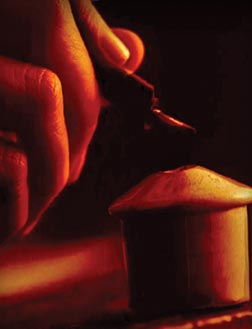Monday, March 4, 2013
5:00 p.m.
Room 201 O’Shaughnessy Hall
SPEAKERS:
Hailey LaVoy
(Medieval Institute, University of Notre Dame)
Early Medieval Women’s Letters
Ephemerality and the Re-mediated Medium
Early medieval women wrote and received Latin letters. Sometimes assumed to have been not educated enough to write or even confined to the margins of cultural and political discourse, their letters instead reveal that they wrote to both men and women on a variety of topics. My dissertation, “Why have you been silent so long?: Women and Letter-writing in Early Medieval Europe, 700-900,” explores the significance of these exchanges, offering a unique insight into the social history of both women and letter-writing. My talk will deal with the epistemological problems (and possibilities) for the study of these women’s letters as media, particularly as regards their transmission. While the original letters upon which I am basing my study have long since been discarded, the texts of the letters were copied by early medieval contemporaries (often in monasteries) into books for preservation and later reference. These manuscripts have been edited and published by modern scholars, further obscuring the original texts by lifting the copied letters from the medieval letter books and rearranging them to fit new chronological or thematic categories imagined by the editors. We will then explore some of the ways through which the texts of women’s letters can be gradually disentangled from modern editions to help reveal the acts and goals of letter-writing as they were perceived in their original contexts.
Denise Ayo
(Department of English, University of Notre Dame)
Turning Women’s Minds into Sausage
Virginia Woolf and The Atlantic Monthly
In Virginia Woolf’s most trenchant critique of mainstream journalism, Three Guineas (1938), her narrator not only implicates the periodical press in patriarchal violence, but conceptualizes it as a “mincing machine” that turns women’s minds into “sausage.” Despite this rejection of the press, Woolf chose to publish a revised version of Three Guineas in the American magazine The Atlantic Monthly. Although archival materials indicate that Woolf carefully edited Three Guineas to create this new version, “Women Must Weep” is characterized by fragmented prose and incomplete arguments. By attending to formal issues arising from interversional variations, this talk will posit that Woolf published “Women Must Weep” to extend her critique of mainstream journalism. I demonstrate the ways in which “Women Must Weep” reveals Three Guineas to be as much about periodical culture as it is about the relationship of feminism to pacifism. Moreover, I argue that the Atlantic version of Three Guineas enacts or performs the original text’s critique of the periodical press and the constraints that it imposes upon the woman writer.
